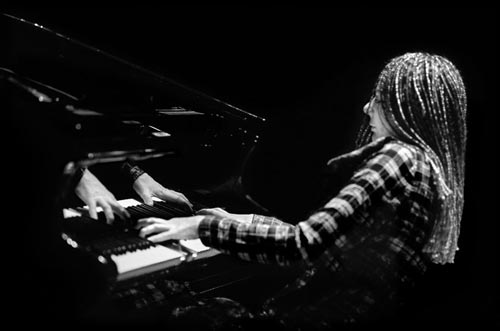Joanna MacGregor, Cadogan Hall, London<br/>Dufay Collective/Alquimia, Snape Maltings, Aldeburgh<br/>Exaudi, Blythburgh Church, Aldeburgh
Not all athletic players are sporty: music has MacGregor

Your support helps us to tell the story
From reproductive rights to climate change to Big Tech, The Independent is on the ground when the story is developing. Whether it's investigating the financials of Elon Musk's pro-Trump PAC or producing our latest documentary, 'The A Word', which shines a light on the American women fighting for reproductive rights, we know how important it is to parse out the facts from the messaging.
At such a critical moment in US history, we need reporters on the ground. Your donation allows us to keep sending journalists to speak to both sides of the story.
The Independent is trusted by Americans across the entire political spectrum. And unlike many other quality news outlets, we choose not to lock Americans out of our reporting and analysis with paywalls. We believe quality journalism should be available to everyone, paid for by those who can afford it.
Your support makes all the difference.Joanna MacGregor is one of contemporary music's great individualists, a uniquely enlivening presence who slices her way through all the barriers she sees as false and limiting. Even so, it was good to be reminded, in her bracing performance of Olivier Messiaen's Vingt Regards sur l'Enfant Jésus at Cadogan Hall, of how absolutely centred in the most rigorous traditions of great pianism her music-making is.
Written during the liberation of France in 1944, this work is one of the most monumental in all piano literature, its 20 contemplations of the infant Jesus coming in at around two hours. MacGregor played it without a break, and with an expressive intensity that never faltered, her tone immaculate at every dynamic level. What's more, the piece's virtuoso demands, especially the sixth and 10th movements – after which, as MacGregor observes, many pianists feel the need to lie down – were tackled with an accomplishment that left any sense of mere determination far behind. These daunting examples of Messiaen's writing at its most complex and Lisztian were despatched with a bravura that contained no suggestion of the strenuous, let alone of cheap display. They were, quite simply, exhilarating on both an intellectual and a spiritual level.
But MacGregor could also encompass the tenderest gazes, such as Le Baiser de l'Enfant Jésus, which begins like a Schumann romance before wafting off into the realms of Messiaen's perfumed eroticism. Perhaps the only significant criticism of her playing was that some of its soft tone needed to be recessed even further to draw the listener into some secret, internal space of the music's own. But in its vast scope and commanding authority, MacGregor's performance would be hard to match.
As one of those artists keen to follow the dotted lines linking one sort of music to another, MacGregor would surely have liked the idea behind the first concert in the Aldeburgh Easter Festival, a collaboration between The Dufay Collective and the Spanish group Alquimia, who specialise in the repertoires of the three cultures active in Andalucia in the middle ages: Christian, Jewish and Muslim. There's some evidence, both iconographic and written, that musical collaborations between these communities did take place – though as this is early music the matter is in scholarly dispute. Yet the results in this programme, with the sensuous tones of the Arab kanoun and drums invading the more chaste textures of the 13th-century Cantigas de Santa Maria, were aurally persuasive, and often entrancingly beautiful.
More austere was the set of Seven Passion Texts by the German composer Wolfgang Rihm, which the virtuoso vocal consort Exaudi sang in the acoustically perfect Blythburgh Church as the festival's second event. They lived up to conductor James Weeks's description of them as "melted Bruckner", though their oblique references to other past musics covered wider ground, including Orlande de Lassus, of the late Renaissance, whose settings of similar texts made a neat complement to Rihm's 21st-century equivalents.
Join our commenting forum
Join thought-provoking conversations, follow other Independent readers and see their replies
Comments